Kathleen Cushman on Teaching as a Team Sport Transcript
Card: Tch Teaching Channel
In Partnership with The William and Flora Hewlett Foundation
Card: New Visions for Public Schools
Expert Commentary by:
Kathleen Cushman
Lower Third: Kathleen Cushman
WKCD.org
Author, "The Motivation Equation"
+++ 00:00:10 +++
Kathleen Cushman: My name is Kathleen Cushman, and I've been documenting the learning of adolescents for over 25 years. The most powerful thing that I've found that relates to how teachers do their work is some old research that's called "Value and Expectancy" research. And it says that in order to want to do something, or to learn something, we have to first value that thing. We have to put some value on it. And the second thing is that you have to have your own--
+++ 00:00:41 +++
you, yourself have to expect that you can succeed at that with a reasonable amount of effort. And I call those two factors the factors in what I call "The Motivation Equation." So Value, V, times Expectation of success, E, equals M, the Motivation that results. Most of us who are teachers tend to think that motivation is something that you come in with. That people come in with motivation or without motivation.
+++ 00:01:13 +++
But in fact, it's not. It's not a precursor of learning. First, you have to have the factors that together combine to produce it. When we teach, we tend to teach the way we were taught. And so if we weren't taught in a deeper learning fashion-- which so many of us were not-- then our go-to behaviors tend to be the way that we were ourselves taught. So New Visions has done a very smart thing by working with teachers in
+++ 00:01:47 +++
very respectful ways in small groups, to get them used to being taught in a different way. And in doing that, they're modeling the inquiry process, and so that the teacher can then take it into the classroom. And the thing I found so interesting about the New Visions video was that you could see the teachers in that small group with the coach, beginning to take in and understand what it means to critique the way you're doing something yourself: self-assess. Try something
+++ 00:02:19 +++
new in an environment that makes it okay to try something new. An environment where they feel okay, because they're being treated respectfully. The coaching in New Visions particularly stood out, because what New Visions is doing is coaching adults who then model that coaching that they received. And then you could actually see that move into their classrooms as they worked with those two students, Natalie and Chris, and they called them to the board to work on their work that they had been struggling
+++ 00:02:50 +++
with. All I could think of was here's this teacher who has experienced this herself. She had been called to the board herself, in her small community of fellow teachers. And she had been treated with respect while she confronted what she was doing that didn't work. And you saw that very same thing, very grounded, very respectful, as she moved to her students. And the students seemed okay with it. Because the emotional tone of it was something that helped them to feel okay, helped them to reflect, helped them to think,
+++ 00:03:26 +++
plan their next steps in a way that they could really take risks in getting things wrong, and knowing that it was okay. That's part of the learning process. And as Ron, of New Visions, was saying, they're really working from the premise that if you figure out what the learning process is for adolescents, then you can start going deeper into the work. And I thought that that was very interesting that you saw this, ninth grade teacher is a new teacher, already saying that
+++ 00:03:59 +++
kind of thing, and already working to make students in her class feel that they could take those risks. And another teacher talked about-- the teacher who had Chris and Natalie at the board, talked about perseverance as being what she was teaching. And right in there I just saw, "Okay, this is what the Common Core Learning standards are asking for. They're asking for us to self-critique our work, figure out a problem, work with others to figure out, take their critique. Try things, try new things, and make it our
+++ 00:04:29 +++
own." So all of these things are really dovetailing there. The learning science, the Common Core standards are built on that science. And the understanding that in order to do that, you have to have a serious sense of respect for the learner.
Card: Tch Teaching Channel
In Partnership with The William and Flora Hewlett Foundation
#### End of CUSH_NVTS.m4v ####
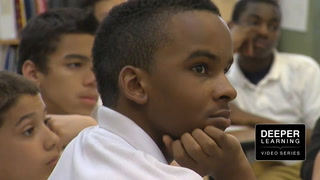
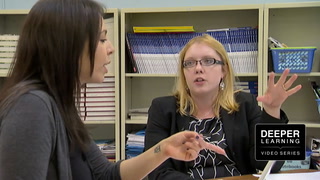
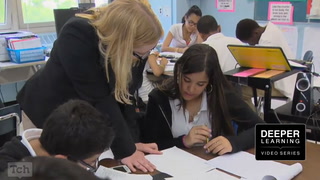
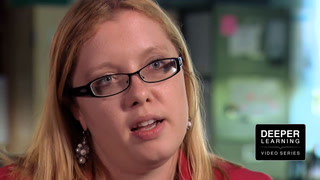
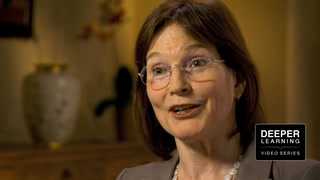








3 Comments
Marc Soltis May 6, 2020 3:39pm
Value and providing a reasonable expectantcy that success will be achieved are vital for motivation to flourish for students.
I love that she said motivation wasn't a given prerequisite. This means that teachers have to "sell their vision". A student doesn't necessarily need to like the subject right away, but over time if they see the value in hard work and start to see and understand success then motivation becomes more self-sustaining.
Growth comes from understanding and an openness to learn. The best teachers are willing to learn new and better ways to address an issur. Experiencing first-hand what the students are going through provides the empathetic platform for students to open up. An unhindered expression, like Ms. Cushman said, allows students the opportunity to take risks and be willing to fail. This is where growth lives.
Paul Elder May 3, 2018 6:49pm
Brian Rodriguez Feb 7, 2015 1:52pm